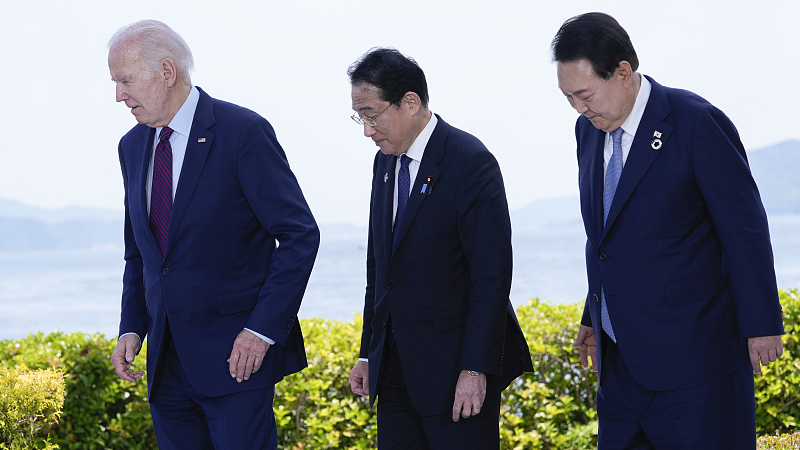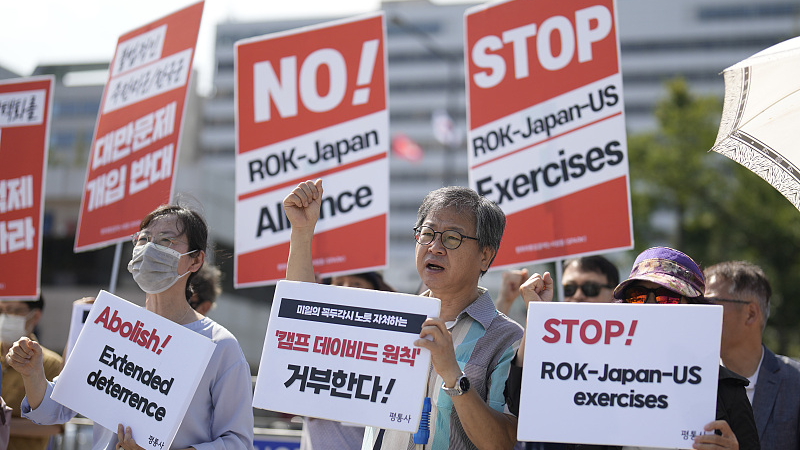
U.S. President Joe Biden (L) walks with Japan's Prime Minister Fumio Kishida (M) and South Korean President Yoon Suk Yeol (R) ahead of a trilateral meeting on the sidelines of the G7 Summit in Hiroshima, Japan, May 21, 2023. /Xinhua
U.S. President Joe Biden (L) walks with Japan's Prime Minister Fumio Kishida (M) and South Korean President Yoon Suk Yeol (R) ahead of a trilateral meeting on the sidelines of the G7 Summit in Hiroshima, Japan, May 21, 2023. /Xinhua
Editor's note: Azhar Azam, a special commentator for CGTN, works in a private organization as a market and business analyst and writes on geopolitical issues and regional conflicts. The article reflects the author's opinions and not necessarily the views of CGTN.
As South Korea commemorates the 78th anniversary of its liberation from Japan's 35-year colonial rule, U.S. President Joe Biden on August 18 is preparing to host South Korean President Yoon Suk-yeol and Japanese Prime Minister Fumio Kishida at the U.S. presidential retreat in Maryland for a trilateral summit. According to U.S. senior officials, leaders of the three countries will launch a series of joint initiatives on technology, defense and other issues.
The gathering is unlikely to produce a formal security arrangement and will revolve largely around building a mutual understanding of regional responsibilities and setting up a three-way crisis hotline. The U.S. still attempts to stoke tensions in Asia-Pacific by seeking to issue a controversial joint statement on regional peace and stability.
Washington has been trying to thaw the strained Seoul-Tokyo relationship, which dates back to disputes over Japan's 1910-45 occupation of South Korea. The Koreans accuse Japan of forcing women to work in wartime brothels for its military and using forced labor, among other abuses. In 2015, Japan issued an official apology to WW II Korean "comfort women" and offered just less than $10 million to the victims under a settlement, but then-Korean President Moon Jae-in scrapped the agreement as it didn't compensate enough for the victims.
Japan has warned of serious repercussions if South Korea tries to enforce its 2018 Supreme Court verdict to order Japanese companies to compensate some victims, and the 2019 export restrictions reveal this complex relationship. Around the Yoon-Kishida reciprocal trips earlier this year, Tokyo lifted export embargoes on Seoul and some surviving victims accepted Yoon's plan to compensate the plaintiffs but demanded an apology from Japan.
South Korea's concerns about Japan's discharge of contaminated water from Japan's Fukushima nuclear power plant and the continuing representation of Japan's "Rising Sun" as a symbol of past imperial Japan in some textbooks are a steeplechase of hurdles and major annoyances for the U.S. if it is to take advantage of the rapprochement and implement its aggressive policy in the region.
Previewing the trilateral summit, Christopher Johnstone,who served on the U.S. National Security Council twice and is now with the Center for Strategic and International Studies, explains the fragility of the three-way relationship: "I think it's fair to say that in South Korea, President Yoon's efforts are still not widely popular. And in Japan, there's this constant refrain of skepticism that the improvement will be durable and the risk that a future ROK (Republic of Korea) president could flip the table over again."

Protesters shout slogans in Seoul, South Korea during a rally ahead of the Camp David trilateral summit, August 17, 2023. /CFP
Protesters shout slogans in Seoul, South Korea during a rally ahead of the Camp David trilateral summit, August 17, 2023. /CFP
The U.S. has collective defense arrangements with Japan and South Korea separately with some 100 permanent military bases and around 80,000 troops in the two countries. The so-called internationalist U.S. president is exploiting America's massive military footprint to put pressure on both states to mend ties and form a new military bloc in the region with eyes on China.
Over the years, America has become a factory of spreading sophistry across the world. Supported by the country's military-industrial complex, think tanks in the U.S. often hurl bricks at Beijing in an attempt to besmirch the world's second-largest economy internationally. This mindset is both dangerous and shortsighted and carries risks of pushing the region into turmoil.
Experts at these groups seek to institutionalize the process of cooperation among the three governments. U.S. Secretary of State Antony Blinken is following the same notion, expecting "concrete initiatives" to address the regional security issues. The peace across the wider expanse, in fact, is threatened by these very blueprints that seek to incite tensions in order to assert America's dominance.
Washington, through AUKUS – the security alliance comprising Australia, the UK and the U.S. – has already triggered an arms race in the Asia-Pacific and poses a real threat to the security of the Association of Southeast Asian Nations. Any effort to extend such provocative alliances as well as establishment of a Nuclear Consultative Group to reinforce the U.S. "extended deterrence" – deployment of U.S. nuclear-armed submarines in the Korean peninsula as a projection of power and the fresh bid to create a mini-NATO – will indeed exacerbate economic and security challenges with an unpredictable domino effect.
Blinken is partly right when he says the region and the world are being tested by "geopolitical (and strategic) competition," climate and peace crises and nuclear threats. At the same time, the Biden administration needs to reassess its own role in aggravating these challenges and should modify its approach to deal with urgent issues the international community is facing today.
The solution to pressing global challenges doesn't lie in building military alliances, provoking other countries and sparking instability; it's rooted in accepting mutual coexistence, promoting economic and trade cooperation and strengthening joint peacemaking efforts. As long as these essential elements remain absent from U.S. foreign policy, future success of such alliances cannot be assured. With this perspective, the upcoming trilateral summit is a conflict-provoking rather than peace-brokering effort.
(If you want to contribute and have specific expertise, please contact us at opinions@cgtn.com. Follow @thouse_opinions on Twitter to discover the latest commentaries on CGTN Opinion Section.)